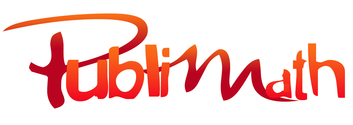Formation initiale et continue pour l’enseignement des mathématiques avec les TICE : cadre d’analyse des formations et ingénierie didactique.
English Title : Pre service and in service teachers' education courses in mathematics with ICT: analysis framework and didactical engineering.
Auteur : Emprin Fabien
Résumé
L’utilisation des TICE pour l’enseignement des mathématiques reste faible et manque de diversité comme le montre des études statistiques récentes que l’auteur a synthétisées dans une première partie de la thèse. Son hypothèse est qu’il existe un déficit qualitatif dans les formations des enseignants qui contribue à expliquer leur difficulté à intégrer les TICE dans leur enseignement. Son objectif est de préciser l’existence et la nature de ce déficit. Pour cela il a construit un cadre théorique d’analyse en spécifiant deux cadres théoriques : la double approche et l’approche instrumentale. Le premier cadre permet une recomposition du travail du formateur et constitue une grille d’analyse des situations de classe proposées en formation alors que le second permet d’analyser le rapport entre l’artefact technologique et respectivement le formateur, l’enseignant ou l’élève. La mise en oeuvre de ce cadre pour analyser un panel de trois formations et les représentations de quatorze formateurs permet de mettre en évidence un genre professionnel, des invariants dans les pratiques de formation et une rupture entre deux identités professionnelles : celle de l’enseignant et celle du formateur. Elle permet aussi de mettre en évidence les limites des pratiques observées, principalement basées sur l’homologie. L’introduction d’une composante réflexive dans les pratiques de formation apparaît alors comme une piste pertinente pour dépasser ces limites. Cette nouvelle hypothèse est testée au moyen d’une ingénierie didactique. Deux mises en œuvre d’un scénario de formation incluant une analyse réflexive des pratiques montrent l’intérêt de cette modalité ainsi que ses limites. Abstract The use of the ICT to teach mathematics remains weak and lacks of diversity as shown by recent statistical studies that we synthesized in a first part of this PhD thesis. Our hypothesis is that there is a qualitative deficit in teachers’ education courses, which contributes to explain why it is so difficult for teachers to integrate ICT in their teaching. Our goal is to specify the existence and the nature of this deficit. For that purpose we built a theoretical framework of analysis starting from two theoretical frameworks: the twofold approach and the instrumental approach. The first framework allows a recombining of teacher’s educator activity and helps to build a grid for analysing classrooms’ situations on which teacher’s education courses are based. The second framework allows analyzing the relationship between technological artefacts and human being involved at three levels: the student, the teacher and the teachers’ educator. We used our framework to analyze a panel of three teachers’ education courses and the representations of fourteen teachers’ educators. This analysis helped to bring to light a professional type defined by invariants in practices and a gap between two professional identifies: the teacher’s and the teacher’s educator’s. It also highlights the limits of practices observed, mainly based on a strategy of « homology ». The introduction of a reflexive component into teacher educators’ practices seems a relevant idea to go beyond these limits. This new hypothesis is tested twice by means of a didactic engineering. This method shows the interest of introducing of a reflexive component this idea as well as questions for further investigation.
Notes
Une version texte intégral est en téléchargement sur le site https://hal.science/tel-00199005
Données de publication
Éditeur IREM de Paris, Université Denis Diderot Paris , 2008 Collection Thèses Format A4, 732 p. Index Bibliogr. p. 287-298
ISBN 2-86612-304-2 EAN 978-2-86612-304-8
Public visé enseignant, formateur Niveau 1re, 2de, lycée, terminale Âge 15, 16, 17
Type thèse Didactique des mathématiques, Paris, 2007 Langue français Support papier
Classification
Mots-clés
